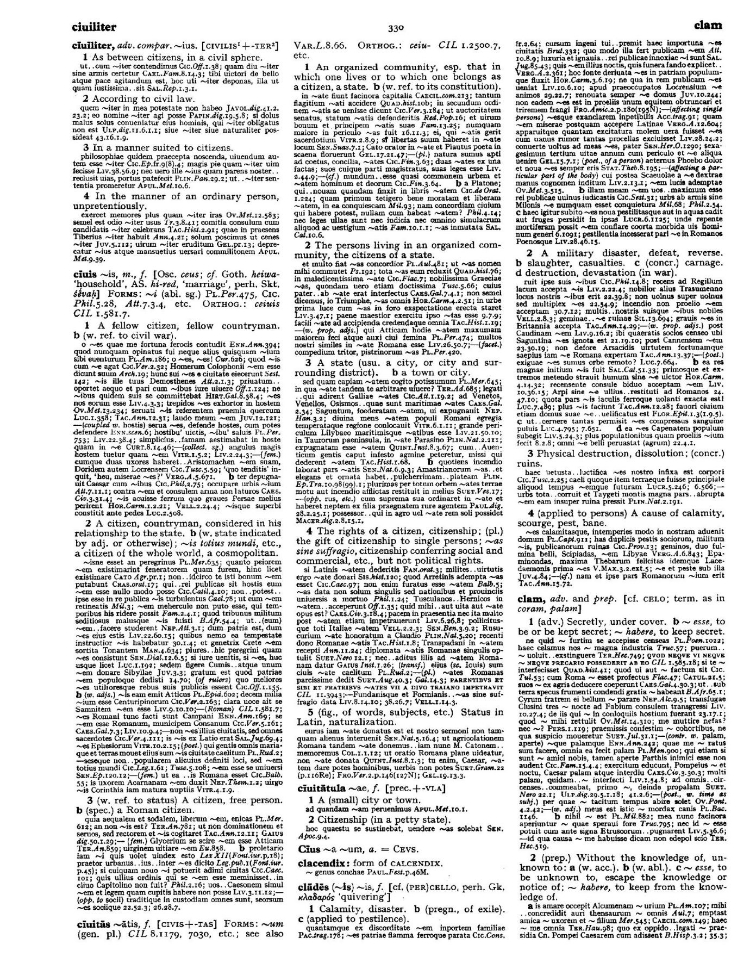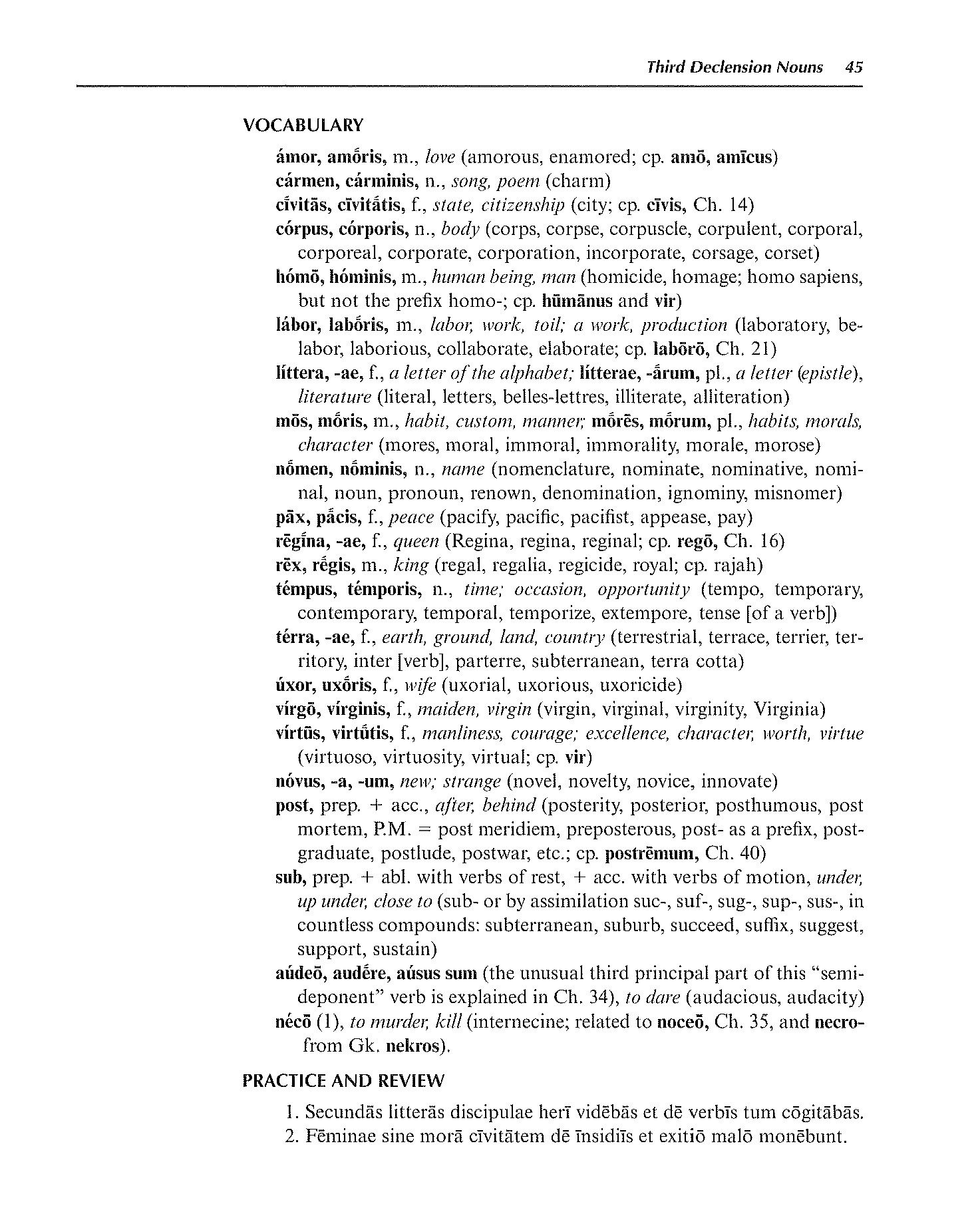
page_listing.tpl
page_subListingDetails.tpl
sub_listingDetails_style1.tpl
sub_listingDetails.title.tpl
cīvitās state
cīvitās is a Latin Noun that primarily means state.
Definitions for cīvitās
Wheelock's Latin
Noun
- 1
state, citizenship
English derivatives:
city
Oxford Latin Dictionary
Noun
- 1
An organized community, esp. that in which one lives or to which one belongs as a citizen, a state. (b) (w. ref. to its constitution).
- 2
The persons living in an organized community, the citizens of a state.
- 3
A state (usu. a city, or city and surrounding district). (b) a town or city.
Sentences with cīvitās
Latin to English
Cīvitās nostra pācem hominibus multīs dabit.Compare Our state will give peace to many men.
Amīcus huius hanc cīvitātem illō cōnsiliō cōnservābit.Compare This man's friend will save this state by that plan.
Propter īnsidiās enim ūnīus hominis haec cīvitās nōn valēbat.Compare In fact, on account of the treachery of one man this state was not strong.
Cīvitātem magnā cum sapientiā gerēbant.Compare They were managing the state with great wisdom.
Civitās nostra lībertātem et iūra cīvium cōnservābat.Compare Our state used to preserve the liberty and rights of the citizens.
Lībertātis causā cīvitās nostra ab alterō virō gerī dēbet.Compare For the sake of liberty our state ought to be managed by the other man.
Quis imperium accipiēns adiuvāre cīvitātem sōlam, nōn sē, cupit?Compare Who in taking the power desires to help the state alone, not himself?
Caesar cūrāvit ut imperium suum maximum in cīvitāte fieret.Compare Caesar took care that his power be made greatest in the state.
Declension table for cīvitās
Cactus2000
| Singular | Plural | |
| Nom. | cīvitās | cīvitātēs |
| Gen. | cīvitātis | cīvitātium / -um |
| Dat. | cīvitātī | cīvitātibus |
| Acc. | cīvitātem | cīvitātēs / -īs |
| Abl. | cīvitāte | cīvitātibus |
Data sources
Notes
- Definitions
- Frederick M. Wheelock, Wheelock's Latin, 6th ed., rev. Richard A. LaFleur (New York, NY: HarperCollins Publishers, 2005): 45.
- P. G. W. Glare, Oxford Latin Dictionary, Vols. 1-8 (Oxford: Clarendon Press, 1982): 250.
- Word frequencies
- Christopher Francese, "Latin Core Vocabulary," Dickinson College Commentaries, last modified 2014, http://dcc.dickinson.edu.
- Paul B. Diederich, The Frequency of Latin Words and Their Endings, PhD diss., (Columbia University, 1939).
- Louis Delatte, Suzanne Govaerts, Joseph Denooz, and Etienne Evrard, Dictionnaire fréquentiel et index inverse de la langue latine [Frequency Dictionary and Inverse Index of the Latin Language] (Liège, Belgium: Laboratoire d'analyse statistique des langues anciennes de l'Université de Liège [L.A.S.L.A.], 1981): 120.
Bibliography
Allen, Joseph H. Allen and Greenough's New Latin Grammar for Schools and Colleges: Founded on Comparative Grammar. Edited by James B. Greenough, George L. Kittredge, Albert A. Howard, and Benjamin L. D'Ooge. Boston, MA: Ginn & Company, 1903.
Crystal, David. A Dictionary of Linguistics and Phonetics. 6th ed. Oxford, UK: Blackwell Publishing, 2008.
Delatte, Louis, Suzanne Govaerts, Joseph Denooz, and Etienne Evrard. Dictionnaire fréquentiel et index inverse de la langue latine [Frequency Dictionary and Inverse Index of the Latin Language]. Liège, Belgium: Laboratoire d'analyse statistique des langues anciennes de l'Université de Liège (L.A.S.L.A.), 1981.
Diederich, Paul B. The Frequency of Latin Words and Their Endings. PhD diss., Columbia University, 1939.
Francese, Christopher. "Latin Core Vocabulary." Dickinson College Commentaries. Last modified 2014. http://dcc.dickinson.edu/latin-vocabulary-list.
Gildersleeve, Basil L., and Gonzales Lodge. Gildersleeve's Latin Grammar: Third Edition, Revised, and Enlarged. 3rd ed. London, England: Macmillan and Co., 1903.
Glare, Peter G.W. Oxford Latin Dictionary. Vols. 1-8. Oxford, England: Clarendon Press, 1982.
Krüger, Bernd. "Latin Conjugation Tables." Cactus2000. Accessed May 5, 2023. https://latin.cactus2000.de/index.en.php.
Pierson, Nick. "Sound of Text." Accessed October 26, 2019. https://soundoftext.com.
Wheelock, Frederick M. Wheelock's Latin. 6th ed. Revised by Richard A. LaFleur. New York, NY: HarperCollins Publishers, 2005.
Wiktionary Contributors. "Victionarium." Wikimedia Foundation, Inc. Updated March 18, 2019. https://la.wiktionary.org/wiki/Victionarium:Pagina_prima.
Citation
Chicago (17th ed.)
Allo Contributors. "cīvitās, cīvitātis (n.) - Latin Word Definition." Allo Latin Dictionary. Last modified . Accessed February 24, 2026. http://ancientlanguages.org/latin/dictionary/civitas-civitatis.
Entry created on . Last updated on .







